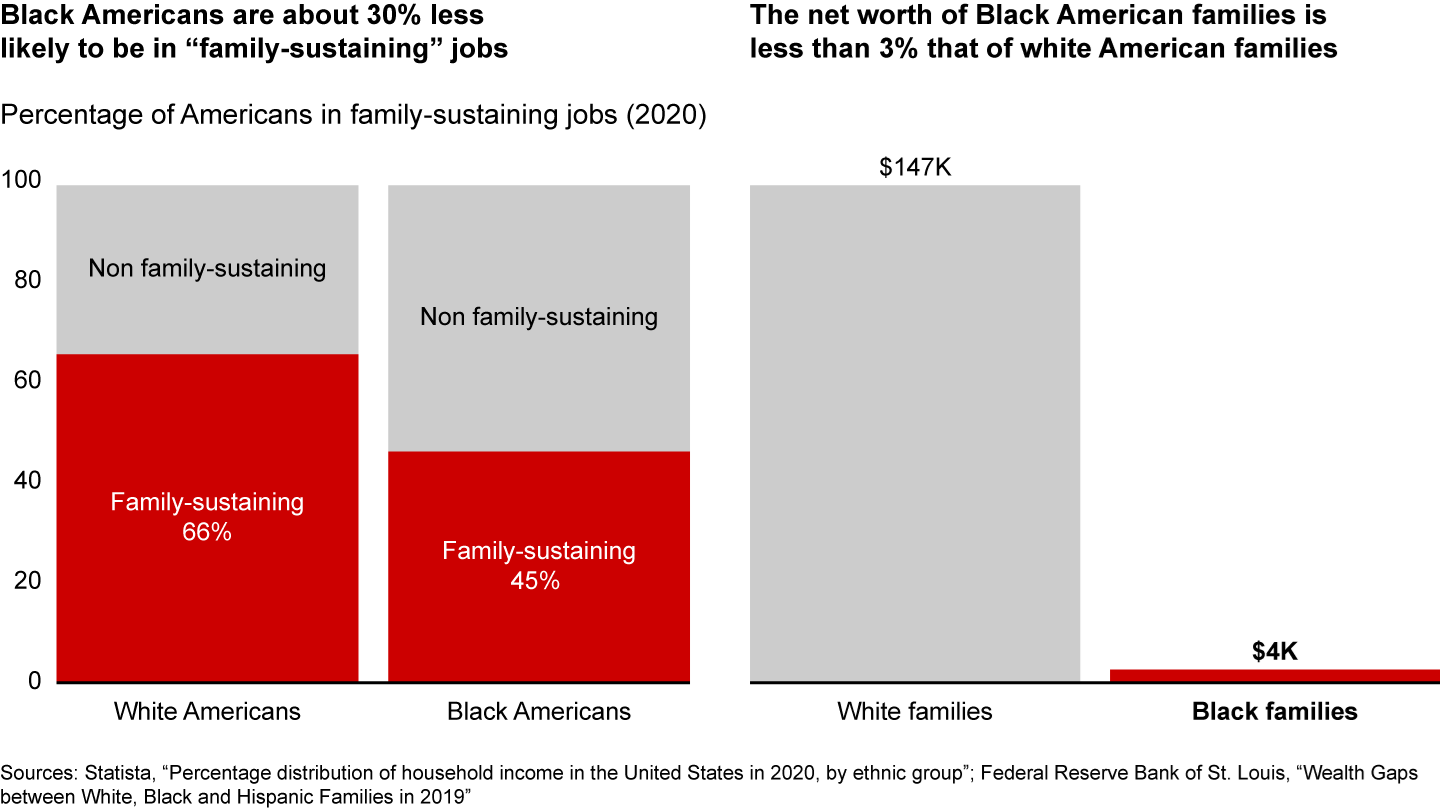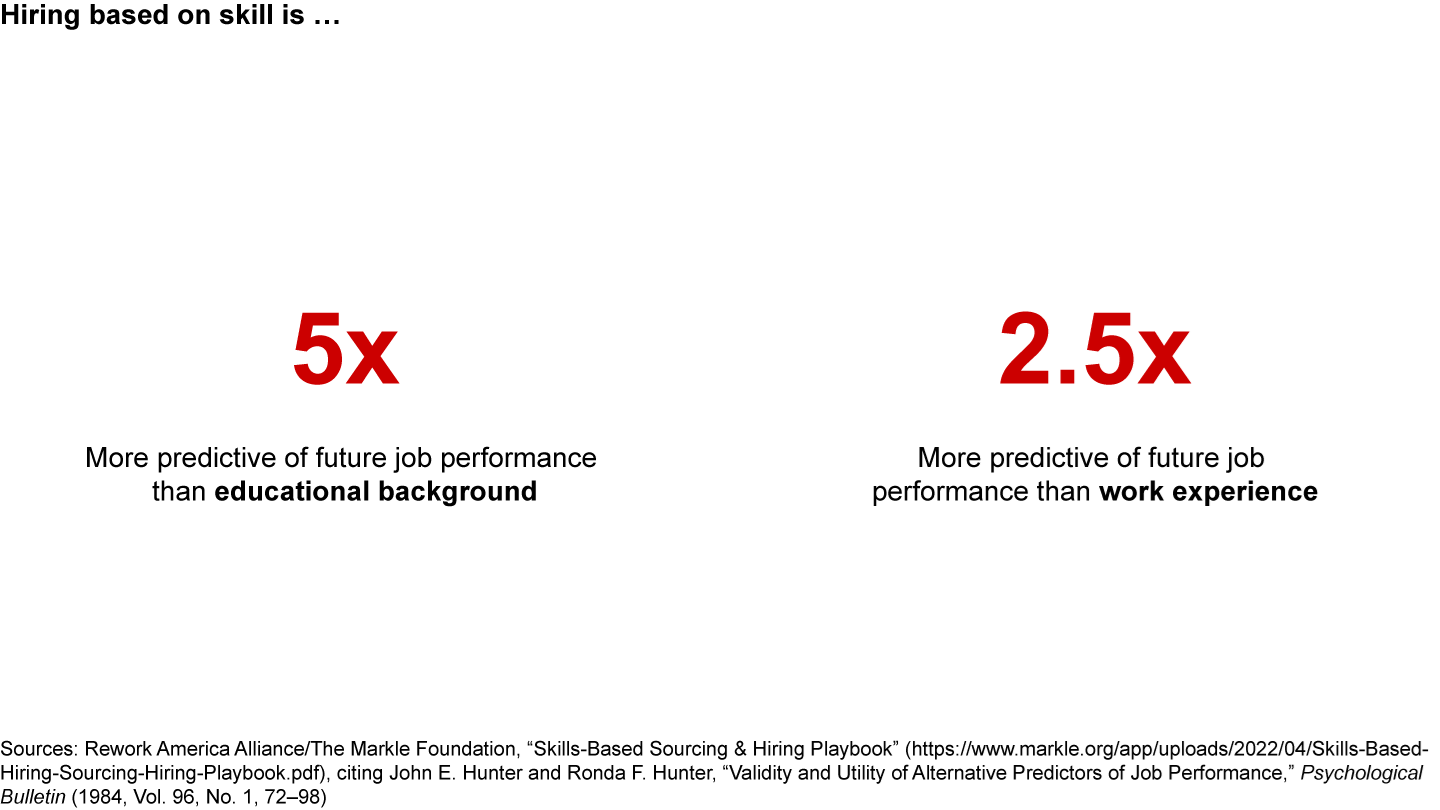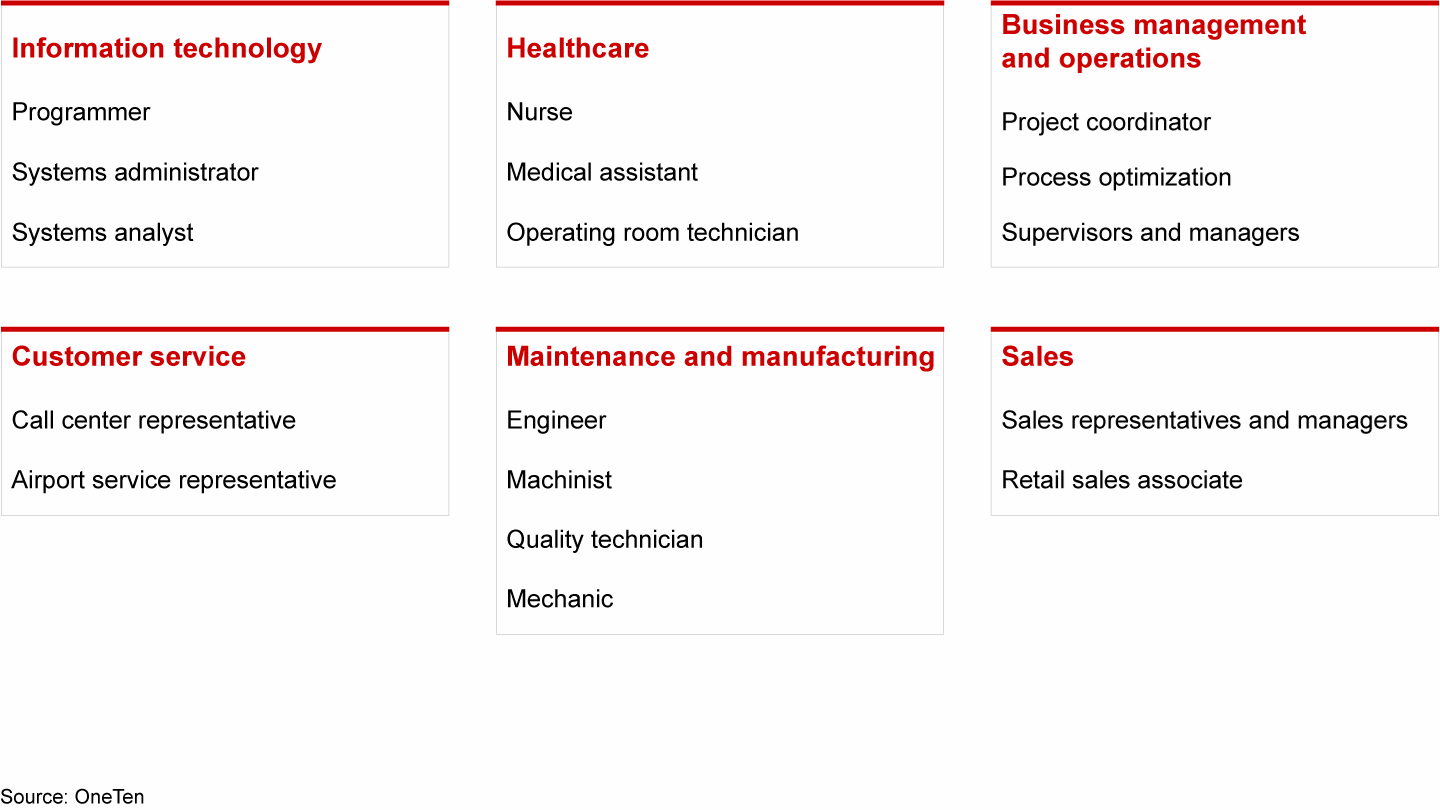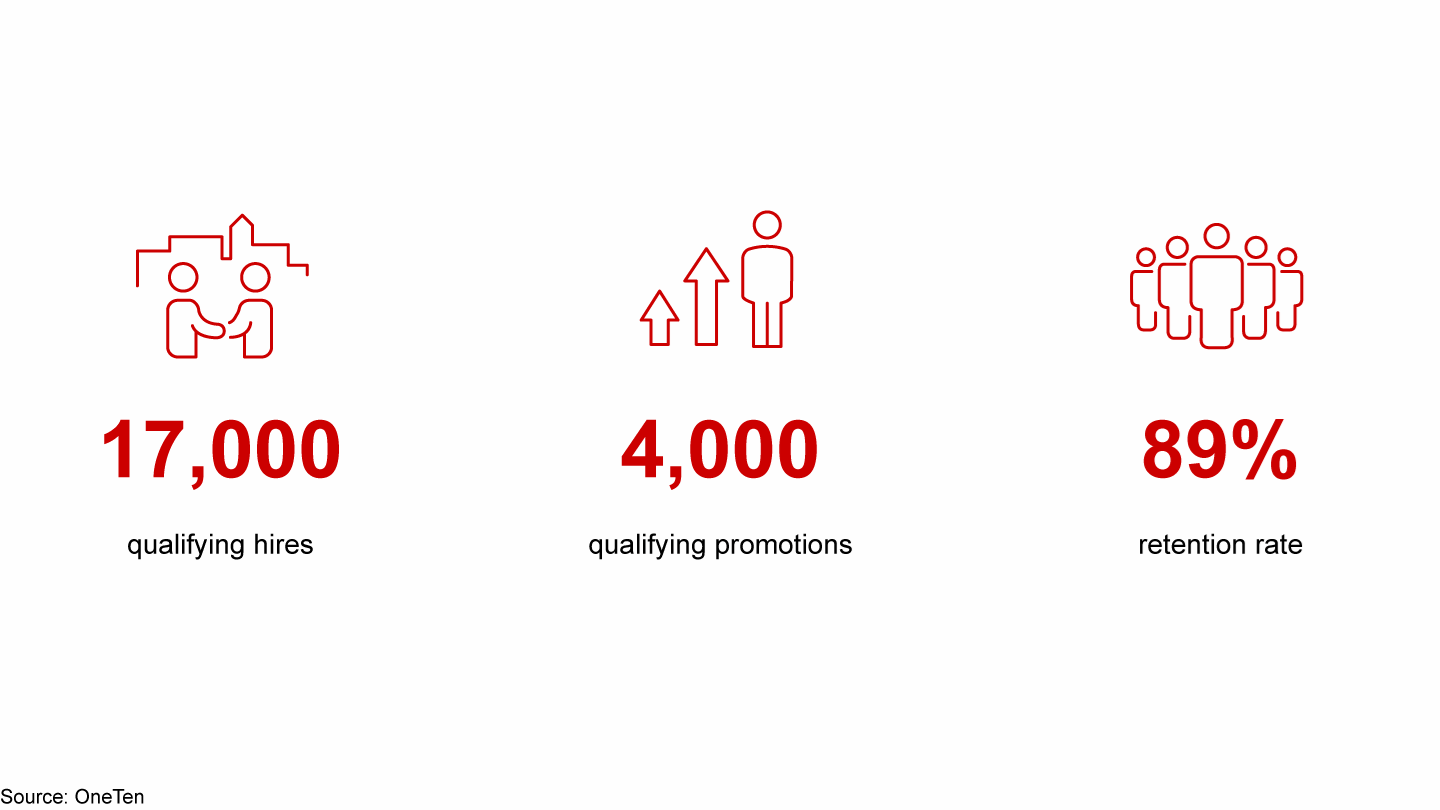Brief

한눈에 보기
- Black Americans are 30% less likely than white Americans to have jobs that pay family-sustaining wages—a key factor in the income and family wealth gaps between Black and white Americans.
- One key barrier to Black talent obtaining these jobs is that 70% to 80% require a four-year college degree, which 75% of Black Americans do not have.
- Requiring four-year degrees is not the only way to assess talent or identify the best candidates, and skills-first hiring can mitigate this credentials barrier, making the process fairer for all job applicants.
- The business case is strong: Skills-first hiring criteria are 5 times more predictive of future job performance than educational background and 2.5 times more predictive than work experience.
- While the transition to skills-first hiring—particularly the shift in culture and mindset it entails—is challenging, there are proven steps companies can take to make the switch successfully, as illustrated by the example of companies in the OneTen coalition such as Merck.
The large employment, income, and wealth gaps between Black Americans and white Americans pose a major challenge to racial equity in the US. Yet companies have the ability to address at least one aspect of this challenge by eliminating a barrier that disproportionately affects Black Americans: The credentials required to apply or be considered for most jobs that pay family-sustaining wages.
Written in collaboration with
Written in collaboration with

A family-sustaining wage, in our definition, is approximately $40,000 to more than $90,000 a year, depending on location (and based on MIT’s living wage calculator). Today, some 70% to 80% of family-sustaining jobs require a candidate to have a four-year college degree to be considered. This is true even though, in many cases, a degree may not be the best or only way to assess whether a candidate has the skills to successfully perform a particular job.
Because more than 75% of Black Americans today do not possess a four-year degree, Black talent is less likely than white talent to be considered for, or to land, family-sustaining jobs. This discrepancy constitutes just one of many systemic barriers that are reflected in the income and net worth gaps between Black and white Americans (see Figure 1).
Disparity in access to family-sustaining jobs is a major cause of disparity in family net worth


A four-year college degree can be a valuable credential and a pertinent requirement for many jobs. But employers can—and, we will argue, should—consider the underlying skills required for particular jobs and whether a four-year degree is the best or a necessary gauge of those skills.
The transition to skills-first hiring can be quite challenging, but we have seen that addressing the credentials barrier can benefit all workers as it is already benefiting Black talent, and be a boon to employers as well. In December 2020, Bain and Grads of Life helped establish OneTen, which has a goal of getting 1 million Black individuals hired or promoted into family-sustaining jobs over 10 years. Our organizations advocate for, and help companies implement, skills-first hiring to advance the prospects of Black job applicants who may lack four-year degrees. Many of Bain’s clients are also implementing skills-first hiring, and Bain has adopted this approach internally in certain areas as well. We have learned through this work that the methods used by organizations that are making the switch successfully can be implemented by any organization.
The right and smart thing to do
Black workers seeking family-sustaining employment without having a four-year college degree face other obstacles too. Racial stereotyping, the lack of shared identity—and the affinity and networks this creates—with hiring and on-the-job managers, and subtle forms of bias in the hiring and promotion processes create barriers for Black talent over and above those posed by rigid educational requirements that apply to all job-seekers. This makes skills-first hiring a moral obligation, as it is a very practical way of addressing one of the major barriers faced by Black and other marginalized talent.
Skills-first hiring should also be seen as a business imperative. The truth is that for a great many (although, as we have noted, not all) family-sustaining jobs, the requirement of a four-year college degree represents not just a barrier for Black talent but a major inefficiency in the labor market from what has been called “degree inflation” by researchers at Harvard Business School and Grads of Life. Bain research using data from Lightcast (formerly Emsi Burning Glass) indicates that more than 60% of middle-skilled positions in America today are “soft bachelor’s” jobs. This means that they are positions for which a four-year college degree is required by the employer even though—considering the skills actually needed to perform the job or the educational backgrounds of employees currently performing it—a four-year degree is not a good proxy for skills. And there is strong evidence suggesting that skills-first criteria are better predictors of job performance than more traditional criteria (see Figure 2).
Skills-first criteria are better predictors of job performance than educational background or work experience


The “how” of skills-first hiring
A comprehensive approach to the transition to skills-first hiring involves changes to pre-hiring, interviewing, and post-hiring practices. Let’s consider each of these requirements.
Identifying and recredentialing the right jobs
The first step in the transition to skills-first hiring is identifying which roles are suitable for this approach. Working with OneTen and Grads of Life to use skills-first hiring to benefit Black job seekers, we have developed ways of considering whether four-year degree requirements are truly necessary for particular roles, especially if incumbent employees in these roles lack four-year degrees. Our experience validates the research cited above, as we have identified many jobs today that are being successfully performed by people who do not necessarily have four-year degrees and can therefore be filled effectively using skills-first hiring (see Figure 3).
Research shows many jobs across industries and at all levels of seniority, like these examples, are good candidates for skills-first hiring


Companies can recredential appropriate jobs for skills-first hiring in the following ways:
- Removing degree and work experience requirements. Skills that are merely assumed by these requirements are replaced with the particular technical, industry-specific, and soft skills that are needed for the position (and can be objectively measured).
- Ranking identified skills in order of importance. These skills should also be divided into required (i.e., must have on Day 1) and preferred.
- Rewriting job descriptions using the identified skills (10 at most). Job descriptions should also be reviewed to ensure they use language that is jargon-free and understandable by a broad audience. And it is a good idea to include an explicit statement about inclusivity to signal commitment to considering diverse candidates.
Advertising in-demand roles and skills
Once you have recredentialed jobs, you will want to ensure that qualified candidates can learn about openings. To recruit Black talent, for example, it is important to supplement standard recruiting channels, as Black talent may not be fully accessible through them. This means sharing new job postings with targeted channels such as diversity, equity, and inclusion (DEI)-focused recruiters and Black professional network associations. You can also group new job descriptions and requirements in ways that make them easily accessible and filterable (i.e., by specific skills or jobs that do not require a four-year degree) for candidates searching for middle-skill positions, to maximize your chances of reaching the candidates you want to reach.
Screening and interviewing
Similar to skills-first job descriptions, skills-first screening emphasizes skills over credentials. It aims to mitigate credentials-based and other (though not all) forms of bias in the process by means of three steps:
- Redesigning prescreening systems. Experts in unconscious bias can suggest methods for mitigating bias in this first phase of the candidate evaluation process—methods such as time-limiting prescreening assessments, focusing on underlying skills in candidates’ experience, or masking candidate names and photos on application materials.
- Building and educating inclusive hiring teams. Consider creating candidate evaluation and interview panels that are diverse across inherent dimensions such as race, gender, and sexual orientation as well as across acquired traits of experience, education, and training. A good rule of thumb is that at least 30% of panel members should represent diverse groups across dimensions. Companies then need to educate panel members on bias-mitigating processes to ensure they are understood and followed.
- Standardizing skills-first interview questions and evaluation criteria. This step entails focusing the interview process on demonstrated proficiency in required skills. Interview panels should use consistent, skills-first interview guides that list required skills and have been reviewed by a diverse set of colleagues. Candidates’ interview performance should be evaluated using a clear, skills-first rubric tied to the interview guide.
Helping new hires succeed
As with any underrepresented population in the workforce, it is critical not just to recruit and hire non-BA/BS talent using skills-first criteria but to help people succeed once they are hired. Our research and experience show that there are several effective ways to do this. Onboarding processes focused on key skills help provide initial grounding for these new hires. Establishing and clearly communicating career paths create incentives for engagement and help build an internal pipeline for diverse talent, reducing the reliance on costly external talent partners. Growth, upskilling, and professional development opportunities are critical, as are mentorship, sponsorship, and regular feedback. More generally, companies can work on building an inclusive organization in which all employees, regardless of background, are valued for their unique contributions.
Meeting the challenges of skills-first hiring
There is already persuasive evidence that, by following the set of steps outlined above—tailored, of course, to individual companies’ particular needs and circumstances—skills-first hiring can have real impact in increasing access to family-sustaining jobs for Black talent. Since OneTen’s launch in December 2020, companies belonging to the coalition have already scaled up their total hirings and promotions of Black talent dramatically (see Figure 4).
One year after its founding, OneTen and its member companies saw significant progress in skills-first hiring


Despite such evidence of early success, however, there is no getting around the fact that the shift to skills-first hiring can be very difficult. Some of the challenges are technical. For example, credentials-first hiring allows companies to efficiently filter large numbers of job applications, so companies will need to develop and adopt new tools to achieve comparable efficiencies for skills-first hiring. HR managers must be given the resources and support they need to manage such aspects of the transition. More generally, a robust data infrastructure is essential for establishing the organization’s starting point, uncovering talent supply-and-demand mismatches and opportunities, motivating employees to take action on key performance indicators (KPIs), and information sharing, benchmarking, and tracking progress toward goals.
Over and above these technical requirements, the transition to skills-first hiring requires a significant change of culture and mindset. The experience of one founding employer member of the CEO-led OneTen coalition that has enjoyed early success with skills-first hiring, the pharmaceutical company Merck, offers valuable lessons on how to bring about such a shift and turn aspirations into results.
For Merck, which not only hires many individuals with advanced degrees but has also often required bachelor’s degrees in specific fields, the transition to skills-first hiring represents a significant change. Merck began by looking for jobs it could potentially recredential. It found that many of its entry-level jobs either did not require four-year degrees in particular fields or did not require bachelor’s degrees at all. Especially surprising was that, in addition to the functions—manufacturing, IT, sales and marketing, and procurement—where many expected to find a number of jobs that could be recredentialed, even the company’s highly advanced research operations turned out to have entry-level roles that could be performed by talent without four-year degrees. To date, Merck has recredentialed hundreds of jobs.
Having identified these opportunities for skills-first hiring, Merck faced the task of getting organizational buy-in. When the company found, using demographic data, that removing requirements for four-year degrees vastly expanded potential applicant pools and made them much more inclusive, the numbers spoke for themselves. Yet the real key to getting the organization moving has proven to be executive sponsors with influence, authority, and passion.
The value added by these executive sponsors has taken two forms. Because all of them have links to parts of the business where a skills-first approach can have impact, these sponsors are able to influence managers within their own functions who have the authority to make decisions about resourcing and headcount. They can also get the ear of senior leadership to appeal to hearts and minds about the social as well as business benefits of skills-first hiring, and to obtain funding and resourcing to support key initiatives. One notable example is a Merck executive who runs global service centers and proposed opening a new service center with around 100, mostly skills-first jobs in Philadelphia. The new facility has been a great success, demonstrates the importance of the businesses taking ownership of the transition to skills-first hiring, and builds on the success that Merck has experienced across US cities.
A few other lessons from Merck’s experience stand out. One of the major challenges of skills-first hiring is the potential for backlash when employees hired in a skills-first process are perceived as “less qualified” than others. To head off such potential conflict, hiring managers must be convinced of the benefits of the new approach and given the training, resources, and ability to hire based on the new criteria. Merck prepares hiring managers for the transition to skills-first by providing tools to help them think differently about skills they require and writing skills-first job descriptions that are inclusive. This includes coaching hiring managers before interviewing begins to keep the skills-first approach top of mind; and by building on existing DEI work—for example, addressing unconscious bias and building inclusive teams.
Another key to success for Merck, as well as other companies in OneTen, has been starting small and then scaling up. Merck began by identifying small pockets of the organization with very motivated sponsors and appropriate jobs, getting quick wins to build momentum and learn from early experiences. Dedicated resources are vital for getting this process in motion.
Ultimately, of course, every company must find its own path. But we have seen first-hand how skills-first hiring really can work, leading to genuine impact for Black Americans and to stronger organizations as well.

About OneTen
Founded in 2020, OneTen is a coalition of leading chief executives and their companies who are coming together to upskill, hire, and promote one million Black individuals who do not yet have a four-year degree into family-sustaining jobs with opportunities for advancement over ten years. OneTen connects employers with talent developers and other skill-credentialing organizations, leading nonprofits, and community-based partners who support the development of diverse talent. By creating more equitable and inclusive workforces, we believe we can reach our full potential as a nation of united citizens. OneTen recognizes the unique potential in everyone—every individual, every business, every community—to change the arc of America's story with Black talent.

About Grads of Life
We work with leading employers to create inclusive talent strategies that deliver both social impact and business benefits. Through our data-driven approach, we help companies understand their current positioning and create customized engagements to help them achieve their goals.